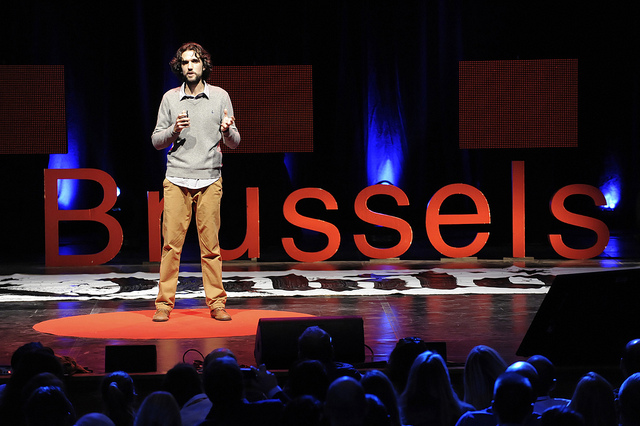Once again, I had the chance to experience the magic of TED during TEDxBrussels this year. I’ve already written about the scrub for the brain I got for the blog of TEDxAmsterdam. For me, some of the highlights were Diana Reiss‘ research on the intelligence of dolphins, TEDx regular Mikko Hypponen on the protection of a free internet and Antony Evans, who creates glowing plants just for the heck of it and to replace street lamps by fluorescent trees (and still manages not to sound completely ridiculous).
As a happiness blogger, though, here I’d like to focus on the talk by Matt Dobson. Dobson is the co-founder of the UK tech startup EI Technologies, which aims to ‘teach smartphones empathy’. That is, he has created an app that based on a speech sample of half a second to a couple of seconds long can recognise emotions. The 7 second video below from Dobson’s blog gives a feel of how it works:
In his TEDx talk, he explains how the app that he and his co-founder Duncan Barclay have conceived works. Human beings – and dogs alike – are able to recognise emotions in people’s voices, even if they don’t understand what is being said. These skills can even be ‘taught’ to smartphones! Whilst human beings can distinguish between emotions intuitively, the story becomes a question of physics and maths for your phone. In physics, spoken text moves in sound waves, and wave lengths vary with emotion. All these acoustic features – loudness, pitch, patterns can be measured, analysed and interpreted, allowing the app to recognise how you feel. Dobson explains it in full in his talk:
And than the million dollar (or Pounds, for a Brit) question: what can you do with this? Is the next step a smartphone also be taught to tell us jokes, make us read feelgood articles or send us a funny cat video whenever we are down? Well, even when the smartphone is invading our lives, our happiness does not depend on it.
But the smartphone may come to the rescue. Around 50% of the population in Western countries suffers distress, or has stress levels that reduce their life expectancy. 15 to 20% has anxiety or depressions. Despite these large numbers, other, more visible, diseases and therapies get way more investment than mental health problems.
A fundamental problem in psychotherapy is that therapists rely on the feelings that depressed people report. Often, people are asked to report their feelings through a mood diary with their feelings. But as depressed people are not the most motivated ones, data in these diaries is often not very reliable. Based on very short samples and data points at several moments in the data, Dobson’s Xpression app can help. Even if the app can’t directly respond itself, it can help you, or your therapist, to understand your feelings during different moments in the day. When the data is there, human empathy does the rest.
Further reading:
- EI Technologies
- Coverage on The New Scientist, CNN Tech and Tech Crunch

